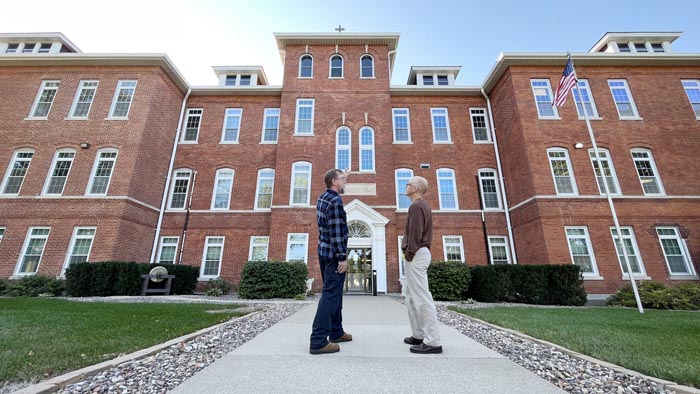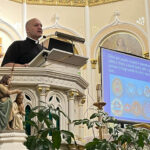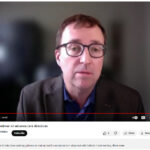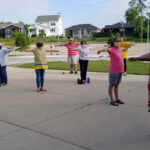
Rich Hatfield, left, maintenance supervisor, and Deacon Kent Ferris, diocesan director of Social Action, talk about energy conservation in front of St. Vincent Center, headquarters for the Diocese of Davenport.
By Barb Arland-Fye
The Catholic Messenger
The 124-year-old St. Vincent Center in Davenport is getting an energy audit as the first step in the Diocese of Davenport’s Laudato Si’ Action Plan launched Oct. 4 on the memorial of St. Francis of Assisi. It is a multifaceted, seven-year plan intended to inspire the people of the diocese to build on their relationship with God, each other and all of God’s creation.
Pope Francis believes that these relationships throughout the world have been harmed and that global climate change is a consequence of the damage, with devastating impacts on the planet and threatening people’s lives and livelihoods. His concern motivated him to write the 2015 encyclical, “Laudato Si’ (subtitled “On Care for Our Common Home,” https://tinyurl.com/ 46h8zznf) and provided the impetus for The Laudato Si’ Action Platform.
It aims to “help Catholics and our institutions, such as parishes, religious orders, schools and hospitals, care for our creation through our facilities, our curricula, our investments and more,” Bishop Thomas Zinkula told Iowa business leaders during a dialogue on climate last fall.
After months of preparation, including enrollment in the Vatican’s Laudato Si’ Action Platform, the diocese now has its own, adaptable plan (view it at www.davenportdiocese.org/
laudato-si-plan) that provides ideas and examples and opportunities for others to share their experiences and suggestions.
“We are in the diocesan phase of the plan right now, so a major focus is energy conservation at the chancery (St. Vincent Center),” Bishop Zinkula said. “We decided to do the energy audit so we can get the information we need to make an informed decision about next steps at the chancery. Besides, as it turns out, the audit won’t cost us anything; that made it really easy to choose to do it!”
“We will share what we learn in this process with parishes, schools, families and others,” the bishop said. “We certainly don’t expect everyone to do everything that is in the multifaceted plan, but hopefully it will get the creative juices flowing. Entities can decide on their own where they want to go with this. Hopefully they will embrace this endeavor and develop a serious plan, but to quote Mother Teresa, even ‘doing small things with great love’ is meaningful and important.” (See the bishop’s letter to the people on Page 3.)
Diocesan Social Action Director Deacon Kent Ferris, who with his staff developed the diocesan plan with input from others, says it will evolve over time. “The bishop’s willingness to undertake an energy audit is responding to the Vatican’s request that Catholic institutions look at their energy consumption and ways in which to reduce the use of nonrenewable energy sources,” Deacon Ferris said. Social Action office volunteer Glenn Leach said the spiritual and economic components of the action plan are equally important.
“The emphasis is on being in right relationship with God, each other and all of creation,” Ferris added. “This is not a top-down mandate. It’s an opportunity to model what it looks like to give thoughtful attention to those relationships and how they can be more consistent with our faith. The Catholic Church has a unique opportunity to be a prophetic voice, one that resonates with people of all faiths.”
An action plan that is accessible and interactive also will raise the diocese’s awareness of the variety of experiences of people diocesan wide. “We want to know about the unique challenges they have. That’s why we’re interested in continuing conversations in rural areas,” Ferris said.
The Omaha-based Verdis Group will conduct the energy audit for the diocese at no cost, due to a $5,000 grant from the Catholic Climate Covenant and its donors. Verdis, which helps organizations identify and implement sustainable solutions, will review the chancery’s utility bills and make recommendations regarding available, renewable energy resources.
Young adult Catholics in particular have embraced Laudato Si.’ Among them is Enrique Berazaluce Riojas of St. John Vianney Parish in Bettendorf, one of a group of college students from the Americas who participated in a Zoom meeting with Pope Francis earlier this year. They shared with him issues they consider important; in doing so, they presented the pope with what they thought to be the root of the issue of migration — climate change.
Berazaluce Riojas and two other young adult Catholics later met with Bishop Zinkula. They asked him to respond to the challenge of climate change and to develop plans to achieve a “net zero” pathway — reaching net zero emissions by 2050.
“I very much laud the diocese’s commitment to the Laudato Si Action Platform,” Berazaluce Riojas said. “This is not an easy choice, it will cost time and resources, but it is the right thing to do and the best way to live out the pontiff’s environmental teachings. In my opinion, nothing works best for evangelization than a commitment to a consistent moral vision.”











